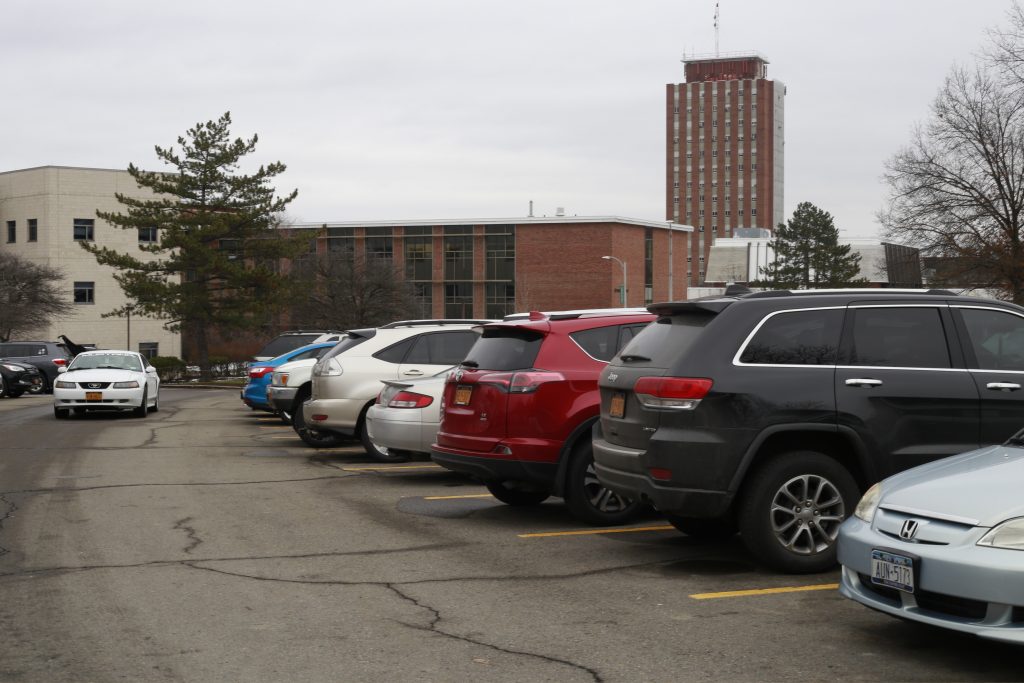
In an effort to ease parking-related stress, students, faculty and staff can now view Binghamton University parking availability through social media.
On Monday, BU Transportation and Parking Services (TAPS) began a new initiative in which updates about empty parking spaces will be posted throughout the day on Facebook and Twitter. The service will be heavily focused on helping commuters find spaces during peak hours, between 9 a.m. and 4 p.m., Monday through Friday.
According to Brian Favela, executive director of TAPS, parking on campus is most congested between 10:30 a.m. and 4 p.m., especially on Tuesdays and Thursdays. He said that he is hoping that the social media updates will help commuters find parking quickly and easily.
“We want to decrease the amount of time it takes to find parking,” Favela said. “[People] can check Twitter and Facebook before heading to campus and eliminate searching for a parking space upon arrival.”
Meghan Schofield, assistant director of marketing at TAPS, said that these services will also be provided during large-scale events such as commencement. In addition, some of the parking availability posts will be available on the University’s social media accounts, and she said that there is also a plan in the future to expand the service to the digital entrance signs on Glenn G. Bartle Drive and the Bunn Hill Access Road.
Reactions from the University community were mixed. Many students, such as Sophia Calidonna, a junior majoring in political science, liked the idea but were concerned about possible hazards.
“It’s a good idea, but people will be checking it as they are driving, and I’m not crazy about people potentially checking their phones for parking availability with all of the foot traffic around campus,” Calidonna said.
Matthew Yoli, a senior majoring in business administration, said he felt that the social media updates would be ineffective, and do nothing to fix the larger problem of a severe lack of parking space.
“If more parking lots aren’t added, putting parking availability information on social media is not going to be helpful,” Yoli said. “It really is a matter of adding parking on campus.”
Other students said they were concerned that spaces would fill up too quickly. Alexander Hymowitz, a senior majoring in political science, said that it would be difficult for TAPS to update commuters on parking availability quickly enough.
“I feel like they will not be able to keep up with the amount of traffic coming on and off campus,” Hymowitz said. “Parking is going to fill up faster than they can update.”
Despite these potential issues, some students embraced the new idea. David Alexander, a junior double-majoring in economics and cinema, said that he thought the social media updates would make parking easier.
“It will make getting to campus and parking easier, and it will help people budget their time,” Alexander said.
Some faculty members also appeared to be excited about the idea. Marina Zalesski, a lecturer of Russian studies, said that she hopes the social media updates will help her in the morning.
“It is a wonderful idea,” Zalesski said. “Last semester was one of the worst I can remember for parking at the University, and this might help alleviate these problems.”
As the social media updates take effect, Schofield encouraged students, faculty and staff to share their thoughts with TAPS via social media, or by calling or emailing the TAPS office.
Social media updates will be posted on the “Binghamton University Transportation and Parking” Facebook page, and at @BingU_TAPS on Twitter.


